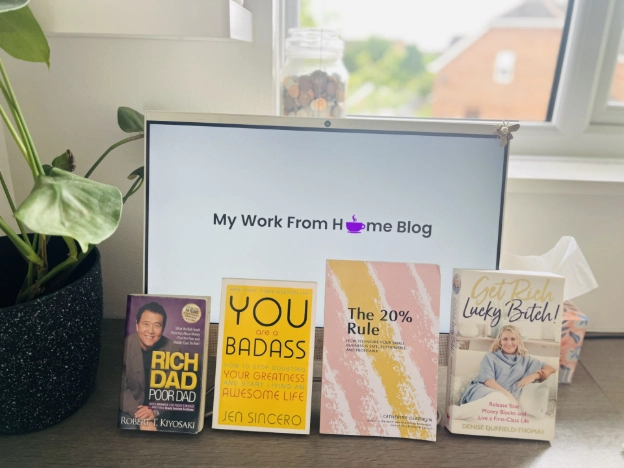Money Mindset for Virtual Assistants

-
Money Mindset for Virtual Assistants: How to Get Paid and Save Smart
- Track Every Penny
- Getting Paid (Without Stress)
- Money Mindset for VAs
- Being Smart With Income
- Building Freedom into Your Finances
- Wrap-Up: Your Money
Money Mindset for Virtual Assistants: How to Get Paid and Save Smart
You started your Virtual Assistant business to make money and create flexibility in your life. Since I began working as a VA in 2011, I’ve learned a lot about managing income, chasing payments, preparing for tax and budgeting for things like the six-week school holidays. I’ve also immersed myself in money mindset books and podcasts and it’s made a huge difference, not just to my business, but to my bank balance.
Having a healthy emergency fund has saved me more than once. Work isn’t guaranteed. Cash flow can change overnight (remember Covid?). In this blog, I’m sharing what I’ve learned about handling my money as a Virtual Assistant, how to track every penny, invoice with confidence and start to build work around your life.
Track Every Penny
When I say track every penny, I mean every penny. I use a simple Excel spreadsheet and track all my expenses. I budget monthly so I know exactly what I need to cover, business costs, subscriptions, MOT and car servicing, holidays and household bills.
Once I’ve totalled up those yearly costs, I divide them by 12 and transfer that amount into a separate account each month. That way, I’m never surprised by a big bill.
Knowing what’s coming in and going out gives me peace of mind. It also helps me know what I can spend on fun stuff without guilt. On Instagram, I share some of the things I’ve enjoyed thanks to this system, spa days, days out with the kids and summer adventures. Take a look and follow here.
I have separate pots of money for my emergency fund, pension, tax and “fun money.” Before I started tracking everything, I’d get to the end of the month and wonder where all my money had gone. Not anymore.
Getting Paid (Without Stress)
You became a VA for the income and the flexibility, to run your home, raise your kids and work in a way that suits you. I invoice monthly, after the work is done. I charge hourly and use a time tracker so I know exactly how long I’ve spent on each client’s work.
I use FreeAgent to track my time and send invoices. It’s linked to my accountant too, which makes year-end smooth and stress-free.
I’ve tried to package my services and hated it. I undercharged, had project creep and felt tied to clients in a way I didn’t enjoy. My business is built around freedom - for me and my clients — so I’ve stuck with hourly billing. It works. I’ve built long-term relationships this way, some going back to 2011.
When I take on new clients, I start small. Once they’ve paid and we’ve built some trust, I take on more. Before any work starts, I’ve already had a video call with them, sent my portfolio, exchanged several emails and had contracts signed. By then, we’re both committed and the risk of non-payment is low, of course, things can go wrong. Since 2011, I’ve only not been paid three times:
£30 from someone well-off who just ignored the invoice.
£200 from someone who ghosted me after I rushed to complete work before a holiday, but they had paid every invoice previously.
And £60 in 2025, someone under a huge amount of personal stress. I chose not to chase it.
I’ve written those off and moved on. Out of the many clients I’ve worked with, three non-payers since 2011 isn’t bad.
My payment terms are always in the contract and I keep clients updated on hours worked (especially in the early months). It keeps everything transparent. If someone forgets to pay, I just chase them two weeks later and again at the end of the month and because I have an emergency fund, I don’t panic.
Money Mindset for VAs
Your mindset about money matters. One idea from the book, “Rich Dad Poor Dad,” really stuck with me, “An asset puts money in your pocket. A liability takes money out.” A car payment? Liability. A Stocks & Shares ISA? Asset.
Here are some of the best money mindset books that helped me shift how I think about money:
Rich Dad Poor Dad by Robert Kiyosaki – This book completely changed how I see assets and liabilities.
You Are a Badass at Making Money by Jen Sincero – Helped me stop playing small and charge properly for my services.
The 20% Rule by Catherine Gladwyn – Taught me the importance of spreading risk across multiple clients and building income sensibly.
Get Rich, Lucky Bitch by Denise Duffield-Thomas – Helped me tackle my money blocks and double my income.
Alongside books, Dave Ramsey’s approach to debt and budgeting also shaped how I manage my money:
Dave Ramsey’s Baby Steps – A practical plan to increase your wealth.
The Ramsey Show podcast – Real stories of people working through the Baby Steps, clearing debt and building wealth.
If you want to run a business, you need to learn about money: compound interest, pensions, budgeting and savings. Your goal isn’t just to earn, it’s to keep your money and let it grow.
Step one: get clients and track your income and spending.
Step two: start learning. Read books. Listen to podcasts. Talk to financially secure friends.
It might feel scary now, but once you start, it’s not complicated.
Image description: This is my desk in my home office with four books that completely changed the way I view money. These books, Rich Dad Poor Dad, You Are a Badass at Making Money, The 20% Rule and Get Rich, Lucky Bitch! — have all helped shape my money mindset and guided me on my journey as a Virtual Assistant. I’ve kept them not just for reference, but also in case my kids ever want to read them one day. They’ve been that valuable.
Being Smart With Income
The school holidays can be tough financially, especially August. That’s why I save 26% of every invoice into a separate account. It covers my tax bills (due twice a year) and gives me spending money for the summer when client work slows down.
I have a few different “pots” set up across different accounts. One of my clients save 50% of their income, but that feels too much for me — 26% works and I built up to it over time.
I also contribute to my pension every month because I get paid at random times, I manually transfer money across — it’s a faff, but it works. Even small contributions are a step toward your future. Start now, even if it’s just a little. You’ll thank yourself later.
Building Freedom into Your Finances
Once you’ve got your business going, it’s time to think about financial stability. Having multiple clients reduces the risk if one slows down or stops altogether.
In the early days, I worked a part-time job two mornings a week. It took the pressure off and gave me breathing space until I had steady VA income.
Now, I’ve built my business to work around my life. I save for holidays, contribute to my pension and take time off without panic. That said, it’s not always smooth, some seasons are intense, others are quiet. But that’s the beauty of it. I like when August goes quiet. It means more time with my kids while they still want to hang out.
Wrap-Up: Your Money
Managing your money as a Virtual Assistant isn’t just about getting paid, it’s about building a life that allows you enough time.
Start by tracking every penny.
Create systems that make invoicing simple and reliable.
Build a buffer, save for tax and pay into your pension.
Learn what you don’t know, read, listen, ask questions.
And most importantly? Trust that you’re capable of figuring it out as you go. You don’t need to be perfect. You just need to be intentional.
The flexibility you were looking for when you started this journey, it’s possible and it starts with getting smart about your money.
Disclaimer: I’m not a financial advisor. Everything in this blog is based on my personal experience as a Virtual Assistant. Please do your own research or speak to a qualified professional before making any financial decisions.
Now read: Work From Home As A Virtual Assistant
And read: How I Became a Virtual Assistant in the UK (And What I’d Do Differently)
-
Money Mindset for Virtual Assistants: How to Get Paid and Save Smart
- Track Every Penny
- Getting Paid (Without Stress)
- Money Mindset for VAs
- Being Smart With Income
- Building Freedom into Your Finances
- Wrap-Up: Your Money

